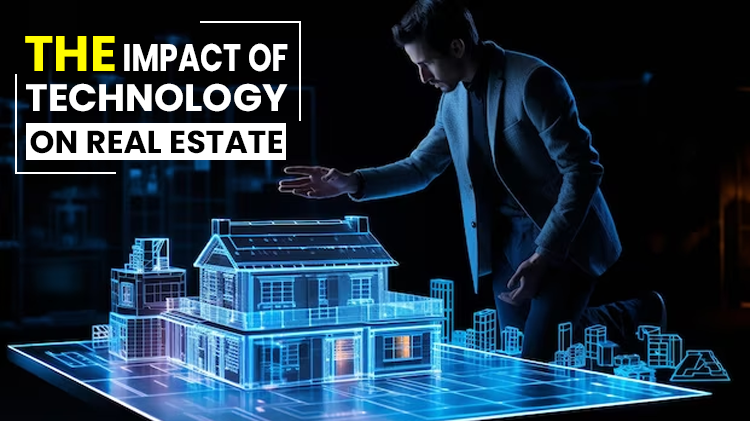Table of Contents
The seamless integration of cutting-edge technology is completely responsible for the astounding metamorphosis that the real estate industry’s terrain has undergone in recent years.
The traditional models of purchasing real estate, conducting sales transactions, and managing properties have undergone a radical mutation, all fueled by the unrelenting march of technological development. Modern technologies like virtual reality, artificial intelligence, blockchain, and the accuracy of big data analytics have opened the road for an era with previously unimaginable possibilities.
This in-depth blog explores the significant and varied effects that technology has had on the real estate industry. We dissect a tapestry that captures the industry’s continuing transformation by considering its many advantages, pondering the complexities of the problems that have evolved, and determining the consequences for potential market dynamics.
Technological Innovations in Real Estate
Because of the always developing field of technical breakthroughs, the real estate sector, which was once characterized by conventional procedures, has ushered in a new era of unrivaled efficiency, ease, and upgraded client experiences. These revolutionary advancements have reshaped the fundamental nature of how real estate is viewed, purchased, sold, and efficiently maintained. They have been made possible by the cutting-edge armory of modern technologies.
It’s interesting to note that this seismic change is apparent across several important industrial pillars, spurred by ground-breaking technical advancements that have reshaped the industry’s boundaries. The deep effects of some of these technical marvels that have drastically altered the real estate environment are revealed as we begin this exploration:
Immersive Marvels: Virtual Reality (VR) and Augmented Reality (AR)
One of the first industries to be profoundly affected by the immersive adoption of virtual and augmented reality is the real estate industry. Prospective buyers and investors have an unrivaled opportunity to tour homes with realism and engagement that transcends geographical boundaries thanks to these cutting-edge technologies.
Stakeholders may immerse themselves in the immersive experience of touring buildings, evaluating interiors, and imagining spatial layouts without actually having to step foot on the property thanks to the use of virtual reality (VR) headsets and augmented reality (AR) software. This ground-breaking method not only speeds up decision-making but also dramatically reduces the costs and delays associated with conventional property viewings.
Virtual and augmented reality have provided the real estate business with a paradigm change by going beyond the bounds of physical presence, expediting the communication between buyers and sellers and enhancing the transparency and accessibility of property information.
The Cognitive Revolution: Artificial Intelligence (AI)
The search for properties and how they are presented to potential purchasers have undergone a fundamental upheaval thanks to artificial intelligence (AI), which has emerged as a catalytic force. Real estate is no longer constrained by manual searches and arbitrary preferences; instead, AI-driven algorithms sift through massive datasets, combining complex patterns of customer preferences, geographic relevance, and property attributes to create personalized property recommendations.
Customer interaction is further increased by the emergence of chatbots and virtual agents that are AI-powered. These clever user interfaces offer prompt responses to queries, supplying clients with pertinent data and aiding them in their search for properties. AI enhances both the consumer experience and the ability to make knowledgeable property selections through the symbiotic dance between humans and technology.
Leveraging Trust: Blockchain Technology in Real Estate Transactions
The real estate transactional web has a place for blockchain, which is praised for its unwavering transparency and bolstered security. This decentralized technology creates irrevocable records of property ownership and transaction histories, reducing the likelihood of fraud and establishing a culture of consumer trust.
The execution of contracts is revolutionized by smart contracts supported by blockchain because they do away with middlemen and introduce automation. Property transactions go through an extraordinary metamorphosis with a distributed ledger guaranteeing irrefutable records, easing the procedure and boosting efficiency while also strengthening the foundation of trust that underpins real estate operations.
Intelligence in Abode: Internet of Things (IoT) and Smart Homes
The Internet of Things (IoT) and the emergence of smart homes serve as exemplars of the metamorphosis sparked by technology that reaches its tentacles into the very fabric of our dwellings. This innovative paradigm ushers in a network of connected gadgets and appliances that are all connected by the internet’s virtual threads.
IoT-enabled smart homes offer a user interface through which residents can remotely control and monitor their living areas, enabling homeowners to minimize energy use, strengthen security, and improve comfort. These IoT-enabled wonders, which range from smart thermostats that intuitively manage temperature settings to doorbell cameras that strengthen security, not only help to reduce costs but also have the potential to increase a property’s appeal in the eyes of picky purchasers.
Data’s Dominion: Big Data Analytics and Predictive Insights
The imposing presence of Big Data Analytics, at the forefront of this technological renaissance, is profoundly changing how real estate professionals conduct their business. Businesses can delve into the complex web of market trends, consumer preferences, and investment vistas by utilizing the analytical power of enormous datasets, revealing previously hidden vistas of insight.
With the help of predictive analysis, Big Data Analytics serves as a sort of crystal ball that helps investors and developers identify future trends. This foresight breaks the glass ceiling of guessing and ushers in an era of scientifically driven decision-making. Strategic decisions relating to pricing, marketing, and investments are powered by informed accuracy thanks to this foresight.
Finally, the harmony of technical wonders has choreographed an epochal shift in the real estate industry. Each note in this symphony harmonizes to create a crescendo that reverberates with increased efficiency, elevated experiences, and a future that continues to evolve, one technological leap at a time. These notes range from the immersive corridors of virtual reality to the cognitive embrace of artificial intelligence, the trust-forging power of blockchain, the interconnected abodes of IoT, and the analytical vistas of Big Data.
Advantages of Technology Integration in Real Estate
Numerous benefits have resulted from the real estate sector’s adoption of technology, substantially changing conventional paradigms and boosting several dimensions within the vast world of property markets. As a resounding testament, the revolutionary force of technology has emerged, ushering in a new era characterized by increased efficiency, tailored experiences, and strengthened security.
The deep advantages that accrue not just to real estate brokers but also to discriminating customers have been highlighted by the expanding benefits that come from the symbiosis between technology and real estate. A revolution that balances the complexities of real estate transactions with modern technology is sparked by this dynamic synergy.
Efficiency Amplified: A Swifter Path in Property Transactions
A crucial benefit born from the inventive tsunami that has engulfed the real estate business, the steadfast improvement of efficiency in property transactions is at the fore of the technological transformation. The process of purchasing, selling, and renting homes has never been easier because to the convergence of digital platforms and internet technologies.
Property listings can now exist more quickly thanks to the digital world, which eliminates the need for clumsy paper paperwork and time-consuming manual processes. Online property listings are quickly uploaded and easily retrieved, eliminating the time-consuming paper-based trail and streamlining communication between sellers, purchasers, and real estate brokers.
However, the technological revolution doesn’t end with listings. A new era of speedy real estate closings has begun with the introduction of digital papers and electronic signatures. As the contours of automated workflows and data analytics drive transactions towards a prompt and accurate finish, the confusing maze of paperwork and signatures turns into a seamless online experience. who will ultimately profit? All parties concerned save time and money.
Tailoring Experiences: A Paradigm of Customer Personalization
Technology has caused a metamorphosis that reaches beyond just the mechanics of transactions and is reshaping the fundamental nature of the customer experience. The real estate sector is a case in point of how technology has altered the nature of customer interactions, creating a new narrative characterized by unheard-of convenience and customisation.
Prospective buyers can walk through the halls of possible houses in the age of virtual property tours that take place within the constraints of a screen without ever donning anything more formal than their pajamas. The virtual entryway to a world of property research, which transcends physical limits and time constraints, is provided through real estate websites and mobile apps.
However, the introduction of artificial intelligence (AI) is what really drives this personalisation paradigm. The constant presence of AI-driven chatbots and virtual assistants instantly responds to clients’ enquiries, lending the process of finding a new home an air of real-time responsiveness. With a dash of technical wizardry, clients are led, informed, and helped, improving their overall experience with the real estate market.
Real estate brokers may now create a story of personalised interaction thanks to technology. The focus is on recommendations that are based on the interests and habits of the clients, bringing about a level of customisation that suits their objectives. In this unique story, the interaction between brokers and clients grows closer, nurturing a connection that will go far beyond the confines of transactions.
Transparency Fortified: The Guardian of Trust in Transactions
Technology integration has ushered in a period where real estate transactions are supported by two pillars: security and transparency. This technologically-driven architectural change has given the industry a fresh strength, boosting consumer confidence and protecting the integrity of transactions.
Blockchain technology’s revolutionary promise is at the fore of this transformation. Property data now has an unprecedented level of transparency thanks to its immutability and traceability. Because blockchain creates an unbreakable chain of ownership and ensures the accuracy of documents and transactions, the possibility of fraud is considerably reduced.
However, the effects continue after that. Enter smart contracts, a shining example of the creativity that blockchain has fostered. These digitally encoded contracts have the authority to carry out transactions automatically, if certain conditions are met. The usual mess of contract execution transforms into a self-executing, streamlined system that provides efficiency, accuracy, and security in equal measure.
Websites that provide real-time insights into property listings, prices, and market trends also fall under the purview of technology. Instantaneous information empowers both buyers and sellers, giving them the knowledge and resources they need to make wise decisions. Technology monitoring acts as the cornerstone on which customer confidence is built and developed in this transparent environment.
In the end, the blending of technology and the real estate sector manifests as a force with the capacity to transform, casting a range of benefits throughout all facets of the industry. Technology is permanently etching its mark on the ever-evolving real estate canvas, creating a landscape that serves as a testament to the development of an industry that has been redefined by innovation. This impact can be seen in the orchestration of quick and efficient transactions, the creation of personalized experiences, the bastion of transparency, and the repository of security.
Challenges and Risks of Technology Implementation
It is undeniable that the adoption of technology in the real estate industry leads to a wide range of positive effects. Despite the numerous benefits, it is important to be aware of the potential risks and challenges that may result from this revolutionary union. The pursuit of technology integration requires a shrewd strategy—one that actively attempts to avoid problems while also acknowledging them, protecting the integrity of the sector and the confidence of its stakeholders.
Safeguarding the Digital Haven: Data Privacy and Security Concerns
Data privacy and security are becoming increasingly crucial as the real estate market gets more and more digital. Cybercriminals are attracted to the real estate industry’s digital corridors by the possibility of obtaining the vast amounts of financial and personal information that are transacted there.
Data breaches, identity theft, and illegal access all loom large in this world of risk. Such breaches have effects that go beyond the immediate financial ramifications and have the potential to undermine public confidence and the financial health of real estate entities.
A strong armory of data protection measures must be diligently employed in order to combat this real threat. Strong cybersecurity protocols, robust authentication systems, and encryption methods act as bulwarks to keep out nefarious forces. The priority should not only be on transaction security, but also on fostering consumer trust in the world of online real estate and upholding their belief in the confidentiality of their personal data.
Automation’s Dual Edges: Potential Job Displacement and Industry Transformation
The benefits of technology advancement coexist with the risks of prospective job losses and industry change. Data entry, basic customer assistance, and administrative duties are some of the professions that could become redundant as automation and AI-driven technologies become more prevalent in the real estate industry. The sector is on the verge of transformation, and workers must upgrade their skills in order to meet changing client expectations.
A careful balancing act is required given the sector’s transformative winds. A compass is needed to navigate the shifting terrain, and the strategic confluence of human expertise and technical prowess provides that. The personal touch, which is crucial for establishing client-agent interactions and perceiving customers’ needs intuitively, continues to be a fundamental element. The current difficulty is ensuring that the workforce is still capable of producing value in the middle of the digital revolution.
Beyond the Binary: Overreliance on Technology and Human Interaction
Although technology is a powerful ally, there is a risk of becoming too dependent on its mechanized weapons. The importance of human interaction in real estate transactions should never be overridden by the quest of technical efficiency. The foundation of interpersonal relationships, trust, and empathic understanding of the requirements and preferences of clients is where the industry thrives.
A slight degradation of the human touch could result if the automation pendulum swings too far in that direction. Many things might go wrong, including consumer pleasure, brand loyalty, and general experience quality. To ensure that the shift to a technologically driven era is anchored in a seamless blend of efficiency and individualized care, the fulcrum between technology refinement and human interaction must be properly adjusted.
Navigating the Legal Labyrinth: Legal and Regulatory Challenges
Real estate and technology’s complex relationship unavoidably leads to a maze of legal and regulatory complexities. New legal considerations arise as a result of the innovative dimensions that technological advancements like blockchain and smart contracts add to transactions. Legal agreements reflect the complicated web of technical solutions, making the landscape increasingly complex.
Harmonizing the legal and technological spheres is the key. It is essential to make sure that contracts, data protection guidelines, and digital transactions all adhere to local regulations. Collaboration between the real estate and technology industries is of utmost importance since it serves as the pivotal element holding the digital frontier’s superstructure of legality together.
Impact on Real Estate Market and Trends
The introduction of technology into the real estate market has caused a cascade of fundamental changes that have rewritten the very narratives that drive market dynamics and industry trends. The development of technology has resulted in a symphony of change that harmonizes the traditional methods of real estate transactions, marketing, and management with the contemporary digital cadence.
The Dynamic Dance: Shifting Demands and Preferences
As a result of technological advancement, buyers and investors now have a key position in the real estate market. The digital world has evolved into an understated oracle in an era dominated by online platforms and mobile apps, feeding the insatiable want of today’s consumers for immediate, accurate, and up-to-date information.
This exploding demand is directly reflected in the rapid emergence of mobile applications and online real estate platforms. Through the use of these online havens, potential buyers methodically comb through a wealth of information, analyzing every aspect of a house, from location to price and amenities.
A domain traditionally distinguished by deliberate in-person meetings and reliance on middlemen now undergoes a paradigm transition into one of empowered decision-making, supported by information at one’s fingertips. The choreographed symphony of convenience created by the digital touchpoints—from virtual property tours that mimic a physical walkthrough to the speedy completion of electronic documentation—underscores the growing demand for frictionless digital experiences.
Additionally, technology’s influence transcends national boundaries, altering the shape of investors’ goals. With the help of technology, the world market becomes an alluring blank canvas. An era where investors virtually cross oceans to take advantage of opportunities that resound across continents is now possible thanks to online crowdfunding platforms and blockchain-enabled fractional ownership portals that democratize the investment environment.
The Precision of Algorithms: Influence on Property Prices and Market Dynamics
The relentless march of technology has had a significant impact on the market trends and price tags that are attached to properties, which are the fundamental foundation of real estate. Technology and data analytics have combined to provide real estate agents a new-age crystal ball that allows them to see into the complex web of market trends and customer preferences.
In this transformational journey, the advent of big data analytics and predictive modeling is crucial. Real estate agents are more confident and rely less on their gut feelings when setting prices thanks to these analytical tools. The tapestry of pricing decisions is shaped by a broad perspective that includes market demands, historical trajectories, and similar sales, making them more realistic and less dependent on speculation.
The tangible effects of this empirical revolution, which is defined by the accuracy of algorithms, include a more even distribution of property values across the spectrum and a decrease in the spectral specter of expensive properties. The paradigm shift is evidence of technology’s alchemical prowess, where knowledge is transformed into wisdom that can be put into practice and market equilibrium rules supreme.
The consumer experience is simultaneously energized by greater openness. Real-time access to market movements and property values becomes the new standard. The market, long a perplexing puzzle, now responds swiftly to shifting circumstances, changing color like a chameleon as market movements are analyzed via technical lenses.
Virtual Overtures: Transforming Real Estate Marketing and Advertising
The impact of technology unfolds a complex tapestry that goes beyond the world of transactional minutiae and touches the fields of marketing and advertising, which are at the forefront of change. Traditional marketing tactics have been left to history by the digital age, which has ushered in a pantheon of cutting-edge ways that expand the appeal and reach of businesses.
This transition can be heard echoing through the halls of social media splendors, immersive virtual tours, and digital marketing endeavors. The story of real estate marketing is now told via a digital lens, and the corridors of engagement have changed from paper brochures and classified advertisements to pixelated, possibility-filled landscapes.
Real estate agents and companies are now traveling the digital backroads, embracing social media dynamics, adopting search engine optimization (SEO), and composing email marketing symphonies as a result of this paradigm change. The digital tapestry that technology spins expands the audience, blurs borders, and energizes the chase of leads.
Additionally, the canvas of real estate listings includes aspects of virtual and augmented reality. The virtual tour is enhanced by the alluring promise of VR and AR, giving potential buyers an alluring look into the world of a property from the comfort of their home. These technology advances create vivid representations of qualities, attracting interest and participation in a symphony of pixels and potential.
Check: How is M3M City Heights Residential Project in Gurugram?
To Sum Up
Technology has permanently changed the way that real estate is transacted upon, acquired, and managed, which is a tribute to innovation’s ability to disrupt industries.
It is important to not undervalue the efficiency gains, increased consumer interaction, and unheard-of insights into market dynamics that technology brings to the sector. These developments have created a digital symphony that echoes with improved user experiences, faster business processes, and tactical insights.
But the story of technological development is not without its dark sides, presenting difficulties that must be faced and overcome. The staunch defenders of data privacy issues and the threat of potential job displacement stand in the way of a real estate market that is digitally empowered. Not just technological strength, but also a dexterity that combines knowledge, adaptability, and a firm commitment to ethical technological stewardship, is the riddle that is put out.
The light of data privacy glows brilliantly in a world where algorithms arrange transactions and virtual landscapes change into negotiation spaces. Data privacy is a clear worry as a wealth of financial and personal information is transferred with each digital step through the halls of real estate. The risks are clear: data misuse, unauthorized access, and cyber breaches could overshadow the industry’s revival.
A steadfast devotion to strong data protection practices is crucial to navigating these choppy waters. Sensitive data is sentineled by encryption, and secure authentication systems act as gates, blocking the entrance of evil forces. To ensuring that the digital conduit through which data is transmitted is built with the greatest standards of openness and trust, maintaining customer faith in the integrity of their information, rests an ethical obligation that is outside the scope of technology.
The human workforce is at a turning point in its transition among the buzz of automation and the melody of algorithms. As automation expands to include jobs that were formerly performed by human hands, the promise of technological efficiency is frequently tempered with the possibility of job displacement. The real estate industry is not immune to this paradigm change, and employment responsibilities themselves may undergo development.
However, this progression does not mean that humans will become obsolete; rather, it invites them to a point when they must choose between upskilling and reskilling. The road ahead is studded with learning new abilities, mastering digital environments, and developing knowledge that spans the gap between technology dexterity and human intuition. The symphony of success reverberates with a harmonious fusion of technical prowess and human insight, paving a way where both man and machine unite to increase the proficiency of the sector.
Beyond these difficulties, all parties involved must make a commitment to ethical technology integration. The compass that guides this journey is one that is in line with ethical standards as real estate advances into a future dominated by algorithms and virtual interactions. The three pillars of transparency, accountability, and responsible innovation must come together to form a unifying theme that propels the industry forward.
Knowledge becomes the North Star in the vast technological integration tapestry. Resilience is built on a constant desire to comprehend technology’s dynamics, both its potential and possible perils. Flexibility becomes essential, enabling the sector to respond to the changing environment with speed and intelligence.
The ethical litmus test, however, is the final exam that technology must pass. Its integration need to be used to strengthen rather than weaken the integrity of the sector. It should serve as evidence of the promise of innovation, which is motivated by principles of responsibility and community benefit rather than just financial gain.
The future holds both promise and caution in this time of converging technology and real estate in a dance of transformation. The outcome is not predetermined; rather, whether technology develops as a catalyst for success or a tool of imbalance will depend on the stewardship of skilled, flexible, and ethically minded practitioners. The decisions made today will be recorded in the history of real estate for years to come because the stage is set and the story is left open-ended.




